
Cognitive development jerome s bruner
Bruner and Piaget are considered to be the chief theorists among the cognitive constructivists. [19] In order to distinguish between Piaget and Bruner it is very helpful to lay hold of two classifications—that is, one of psychological constructivismand one of social constructivism. [16]
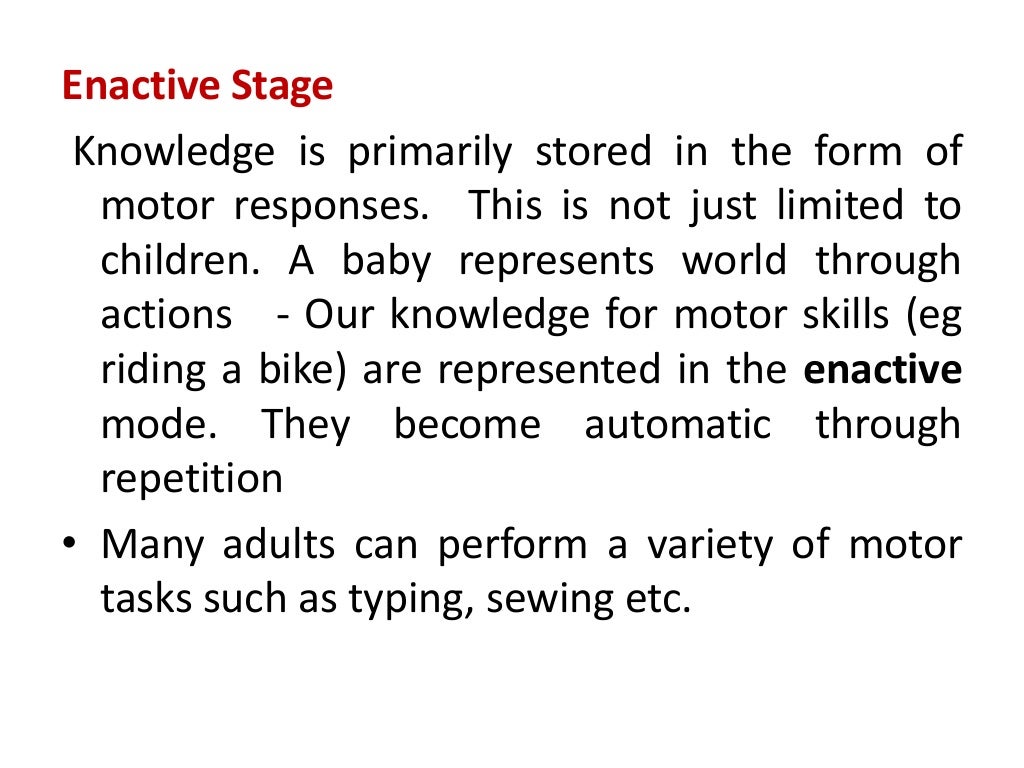
Cognitive development jerome s bruner
Jerome S. Bruner (1915-2016) was a psychologist who has been influential in education mainly by his work in 1963, entitled "The process of education", and long before that with his work on psychology. This chapter will focus on his educational ideas as a foundation of cognitive constructionism and their impact on educational practice.

Educational Implications of Bruner's Cognitive Development Theory YouTube
Bruner's theory of cognitive development was distinct from other stage-based theories of cognition, as it held that even young children can learn difficult concepts with appropriate instructional support, and it readily lent itself to practical educational applications, which Bruner himself helped to design and implement.
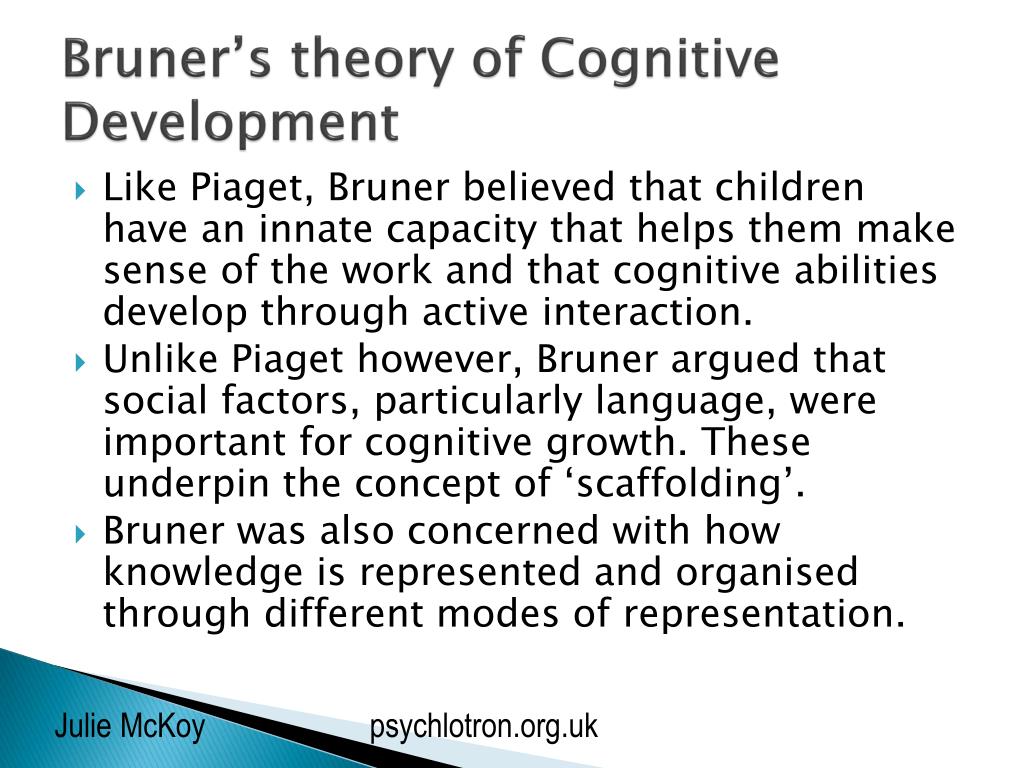
PPT Bruner’s Approach PowerPoint Presentation ID296067
staged theory of cognitive development. Because his theory asserts that the stages are age dependent and based on cognitive readiness, the approximate ages for each stage are included in the discussion of each. Piaget differentiated three types of knowledge that must be present at all stages of cognitive development: physical, logical.
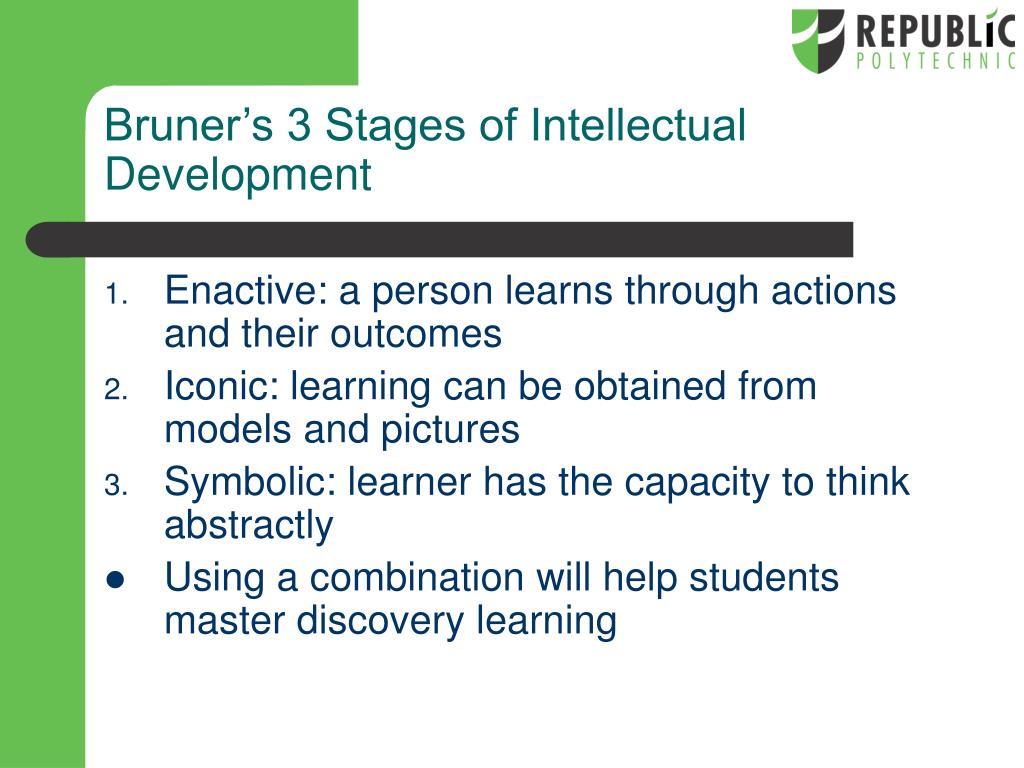
PPT Simulations and Discovery Based Learning PowerPoint Presentation
Jerome Bruner was an American psychologist who made important contributions to human cognitive psychology as well as cognitive learning theory in educational psychology. His learning theory focuses on modes of representation and he introduced the concepts of discovery learning and a spiral curriculum. Subscribe to our newsletter
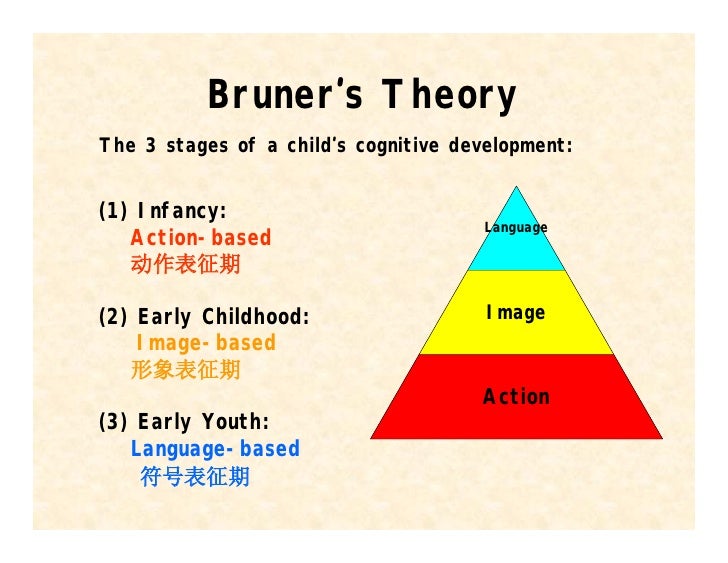
Di Wsp Ppt
Jerome Bruner was born in New York City on October 1, 1915. He received his B.A. degree from Duke University in 1937 and his Ph.D. from Harvard in 1947, where he was a member of the faculty at the Department of Psychology from 1952 to 1972. Furthermore, he was the cofounder and director of the Center for Cognitive Studies at Harvard.

Bruner's Theory of Cognitive Development YouTube
Bruner's Theory of Cognitive Development Authors: Keiichi Takaya Abstract Jerome Bruner is one of the founding fathers of cognitive science, an interdisciplinary approach to the study.
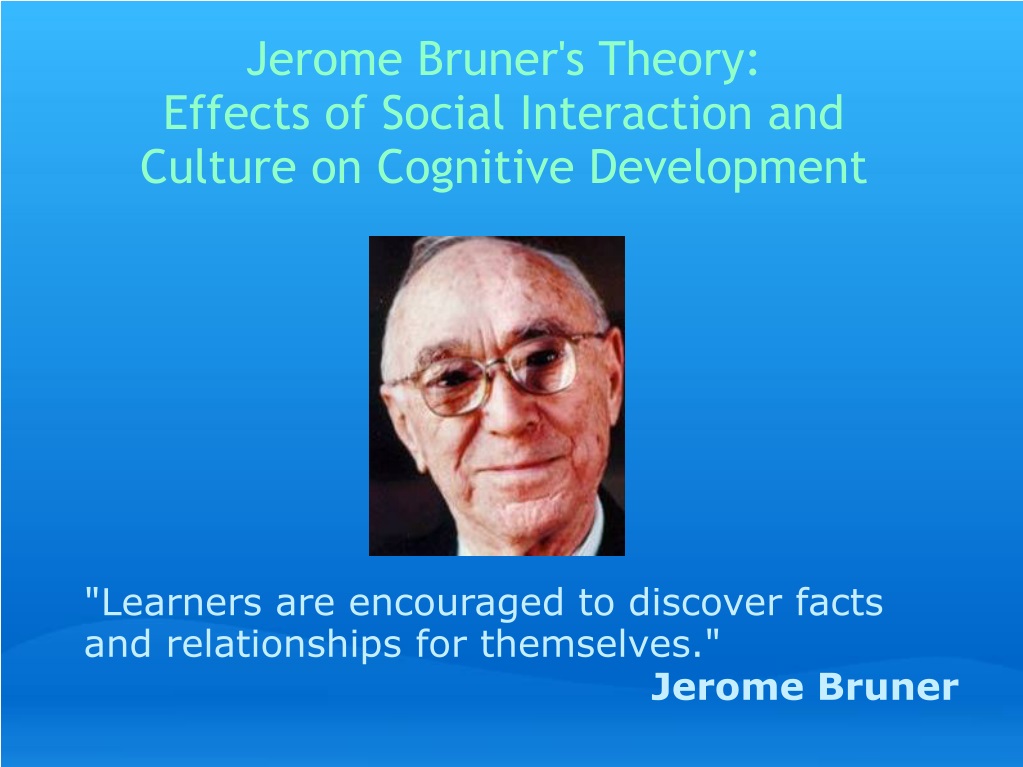
PPT Jerome Bruner's Theory Effects of Social Interaction and Culture
To convey his ideas for instruction and how learners form concepts, acquire knowledge, and problem solve, Bruner developed a cognitive theory of instruction. His theory encourages educators to create instruction which leads the learner through a sequence of statements until the instructional content or problem has been mastered.

PPT Bruner’s theory of Cognitive Development PowerPoint Presentation
Bruner spearheaded the "cognitive revolution" and his work led to significant changes in the American school system. The American Psychological Association (APA) ranks Bruner as the 28th most eminent psychologist of the 20th century. Table Of Contents show Jerome Bruner's Childhood Jerome Seymour Bruner was born on October 1, 1915 in New York City.

BRUNER'S THEORY OF COGNITIVE DEVELOPMENT YouTube
Jerome Seymour Bruner helped to launch the cognitive revolution in psychology — the shift from focusing on how stimuli or rewards provoke behaviours (behaviourism) to trying to understand the.
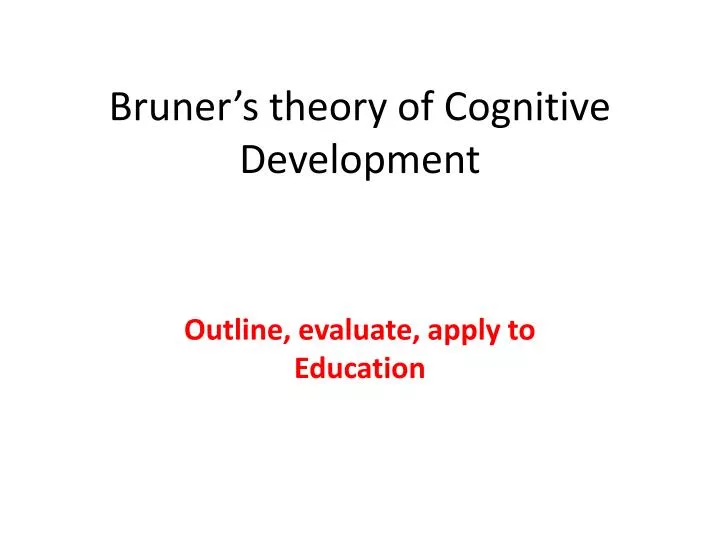
PPT Bruner’s theory of Cognitive Development PowerPoint Presentation
Bruner (1966) hypothesized that the usual course of intellectual development moves through three stages: enactive, iconic, and symbolic, in that order. However, unlike Piaget's stages, Bruner did not contend that these stages were necessarily age-dependent, or invariant.

Bruner's Theory of Cognitive Development Simplest Explanation Ever
Jerome Bruner, (born October 1, 1915, New York, New York, U.S.—died June 5, 2016, New York, New York), American psychologist and educator who developed theories on perception, learning, memory, and other aspects of cognition in young children that had a strong influence on the American educational system and helped launch the field of cognitive.

Bruner's theory of Cognitive Development YouTube
Bruner's cognitive development theory developed the concept of 'readiness for learning'. Bruner's theory suggests that the learner's experiences must be involved in the instructional process to develop a willingness to learn among students.
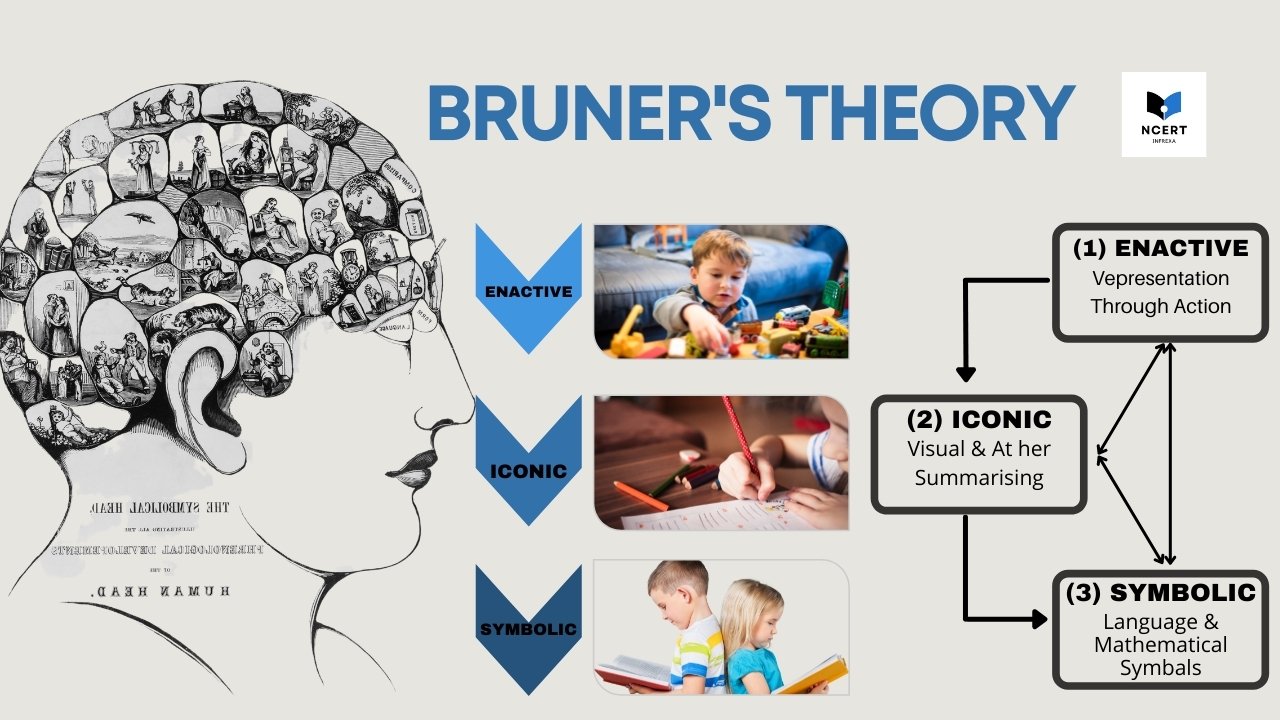
Bruner's Theory of Cognitive Development infrexa
BRUNER'S LEARNING THEORY Andrew Johnson This paper describes some of Jerome Bruner's big ideas. His learning theory posits that learning is an active process in which learners construct new knowledge based on their current knowledge. A closer look at some of the basic elements of Bruner's ideas related to teaching and learning are included.

PPT Bruner Discovery Learning PowerPoint Presentation, free download
A01 -Outline Bruner's Theory of Cognitive Development (D) -- Apply knowledge of Scaffolding to teach a new concept (C) A02 - Evaluate Bruner's theory (B+) Piaget the child = a scientist - dev. occurs in relative social vacuum. • Vygotsky - child = apprentice - dev. occurs through social interaction. Bruner - agreed with Piaget:-
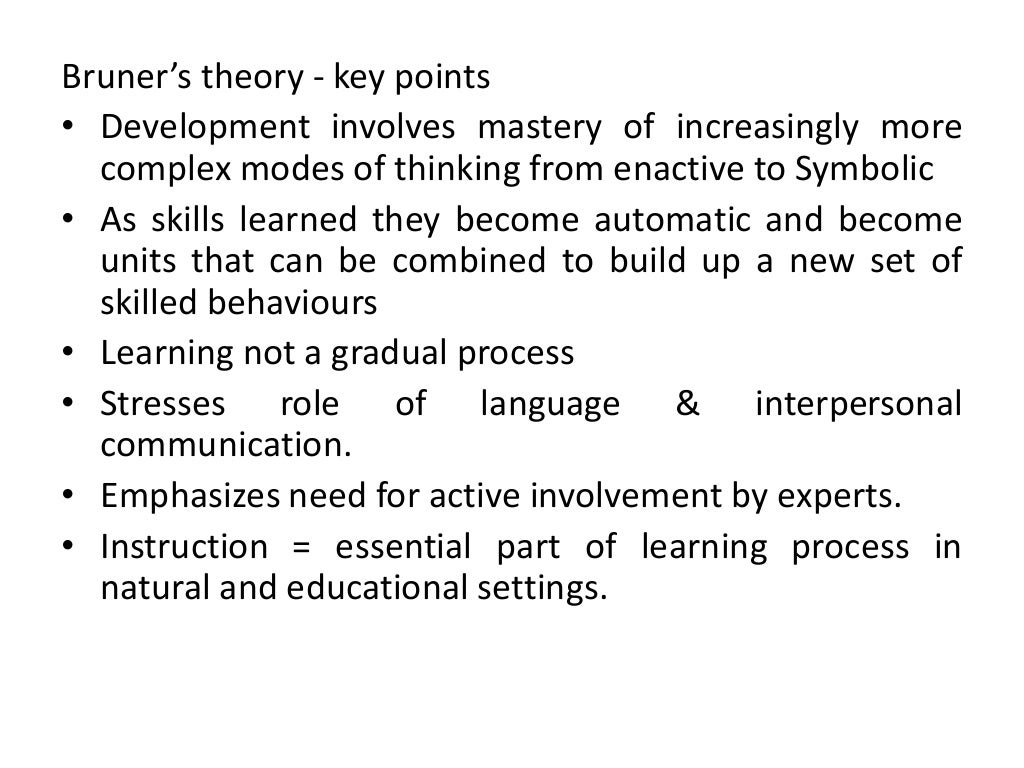
Cognitive development jerome s bruner
In 1966, the Cognitive development theory was proposed by J. Bruner. Bruner has contributed significantly to cognitive development. Modes of Representation There are three modes of representation. They are- enactive, iconic, and symbolic. 1. Enactive representation (0-1 year) Jerome Bruner explained that enactive representation mode appears first.